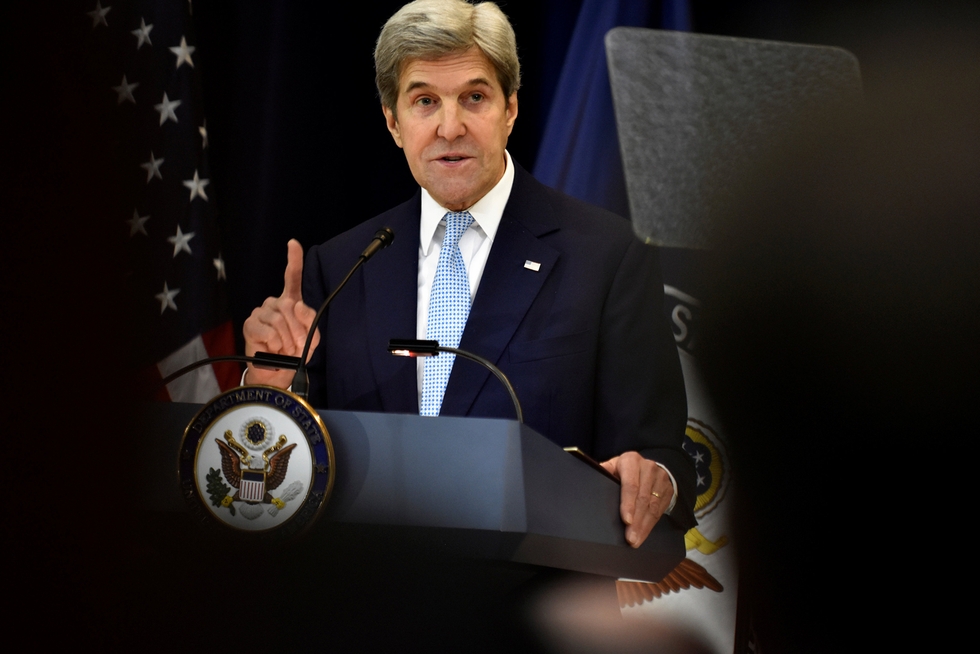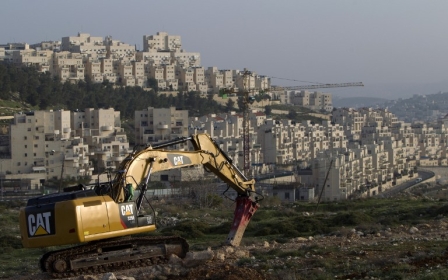Key quotes: Kerry's comments on the Israeli-Palestinian peace process

In a stern parting shot, US Secretary of State John Kerry warned Israel on Wednesday that building settlements on Palestinian land threatens the country's very future as a democracy.
Kerry's long and detailed speech touched on Israeli settlements, Israel's right-wing coalition, criticisms on violent Palestinian outbursts, the plight of Palestinians living in the West Bank and Gaza Strip, and the need for a peaceful two-state solution.
Below are a few excerpts of Kerry's speech.
On Israeli settlements
"The settler agenda is defining the future in Israel. And their stated purpose is clear: They believe in one state: greater Israel."
"We’ve made countless public and private exhortations to the Israelis to stop the march of settlements. In literally hundreds of conversations with [Israeli] Prime Minister [Benjamin] Netanyahu, I have made clear that continued settlement activity would only increase pressure for an international response. We have all known for some time that the Palestinians were intent on moving forward in the UN with a settlements resolution, and I advised the prime minister repeatedly that further settlement activity only invited UN action.
"Yet the settlement activity just increased, including advancing the unprecedented legislation to legalise settler outposts that the prime minister himself reportedly warned could expose Israel to action at the Security Council and even international prosecution before deciding to support it.
"In the end, we could not in good conscience protect the most extreme elements of the settler movement as it tries to destroy the two-state solution. We could not in good conscience turn a blind eye to Palestinian actions that fan hatred and violence. It is not in US interest to help anyone on either side create a unitary state. And we may not be able to stop them, but we cannot be expected to defend them. And it is certainly not the role of any country to vote against its own policies.
"That is why we decided not to block the UN resolution that makes clear both sides have to take steps to save the two-state solution while there is still time. And we did not take this decision lightly.
On Israel's right-wing coalition
"The Israeli prime minister publicly supports a two-state solution, but his current coalition is the most right wing in Israeli history, with an agenda driven by the most extreme elements.
The result is that policies of this government, which the prime minister himself just described as “more committed to settlements than any in Israel's history,” are leading in the opposite direction. They're leading towards one state.
In fact, Israel has increasingly consolidated control over much of the West Bank for its own purposes, effectively reversing the transitions to greater Palestinian civil authority that were called for by the Oslo Accords."
"One prominent minister, who heads a pro-settler party, declared just after the US election – and I quote – 'the era of the two-state solution is over,' end quote. And many other coalition ministers publicly reject a Palestinian state. And they are increasingly getting their way, with plans for hundreds of new units in East Jerusalem recently announced and talk of a major new settlement building effort in the West Bank to follow."
On the plight of the Palestinians
"There are currently about 2.75 million Palestinians living under military occupation in the West Bank, most of them in Areas A and B – 40 percent of the West Bank – where they have limited autonomy. They are restricted in their daily movements by a web of checkpoints and unable to travel into or out of the West Bank without a permit from the Israelis. So if there is only one state, you would have millions of Palestinians permanently living in segregated enclaves in the middle of the West Bank, with no real political rights, separate legal, education, and transportation systems, vast income disparities, under a permanent military occupation that deprives them of the most basic freedoms. Separate and unequal is what you would have.
"Trends indicate a comprehensive effort to take the West Bank land for Israel and prevent any Palestinian development there. Today, the 60 percent of the West Bank known as Area C – much of which was supposed to be transferred to Palestinian control long ago under the Oslo Accords – much of it is effectively off limits to Palestinian development. Most today has essentially been taken for exclusive use by Israel simply by unilaterally designating it as “state land” or including it within the jurisdiction of regional settlement councils.
"Israeli farms flourish in the Jordan River Valley, and Israeli resorts line the shores of the Dead Sea – a lot of people don’t realise this – they line the shore of the Dead Sea, where Palestinian development is not allowed. In fact, almost no private Palestinian building is approved in Area C at all. Only one permit was issued by Israel in all of 2014 and 2015, while approvals for hundreds of settlement units were advanced during that same period.
"Moreover, Palestinian structures in Area C that do not have a permit from the Israeli military are potentially subject to demolition. And they are currently being demolished at an historically high rate. Over 1,300 Palestinians, including over 600 children, have been displaced by demolitions in 2016 alone – more than any previous year.
"I’ve also seen the devastation of war in the Gaza Strip, where Palestinian girls in Izbet Abed Rabo played in the rubble of a bombed-out building."
On US support of Israel
"Time and again we have demonstrated that we have Israel’s back. We have strongly opposed boycotts, divestment campaigns, and sanctions targeting Israel in international fora, whenever and wherever its legitimacy was attacked, and we have fought for its inclusion across the UN system. In the midst of our own financial crisis and budget deficits, we repeatedly increased funding to support Israel. In fact, more than one-half of our entire global Foreign Military Financing goes to Israel. And this fall, we concluded an historic $38 billion memorandum of understanding that exceeds any military assistance package the United States has provided to any country, at any time, and that will invest in cutting-edge missile defence and sustain Israel’s qualitative military edge for years to come. That’s the measure of our support.
"We fully respect Israel’s profound historic and religious ties to the city and to its holy sites. We’ve never questioned that. This resolution in no manner prejudges the outcome of permanent status negotiations on East Jerusalem, which must, of course, reflect those historic ties and the realities on the ground. That’s our position. We still support it.
"We all understand that Israel faces very serious threats in a very tough neighbourhood. Israelis are rightfully concerned about making sure that there is not a new terrorist haven right next door to them, often referencing what’s happened with Gaza, and we understand that and we believe there are ways to meet those needs of security. And Israelis are fully justified in decrying attempts to legitimise their state and question the right of a Jewish state to exist. But this vote was not about that. It was about actions that Israelis and Palestinians are taking that are increasingly rendering a two-state solution impossible. It was not about making peace with the Palestinians now – it was about making sure that peace with the Palestinians will be possible in the future."
Stay informed with MEE's newsletters
Sign up to get the latest alerts, insights and analysis, starting with Turkey Unpacked
Middle East Eye delivers independent and unrivalled coverage and analysis of the Middle East, North Africa and beyond. To learn more about republishing this content and the associated fees, please fill out this form. More about MEE can be found here.




